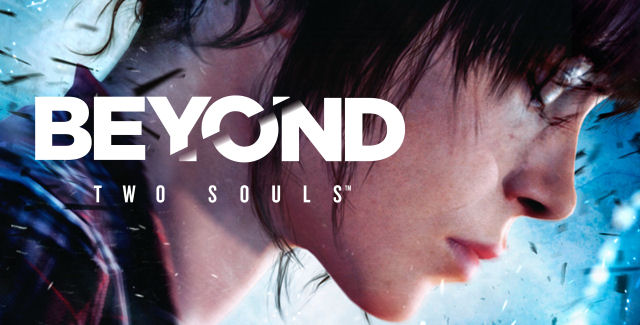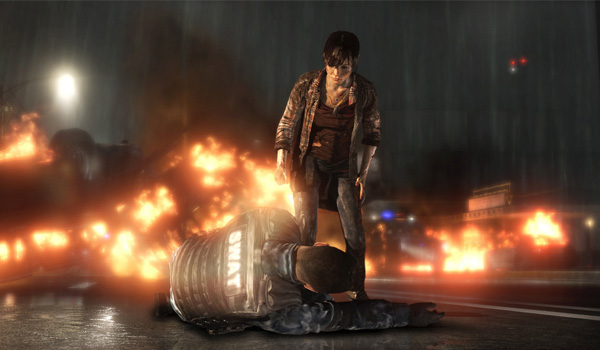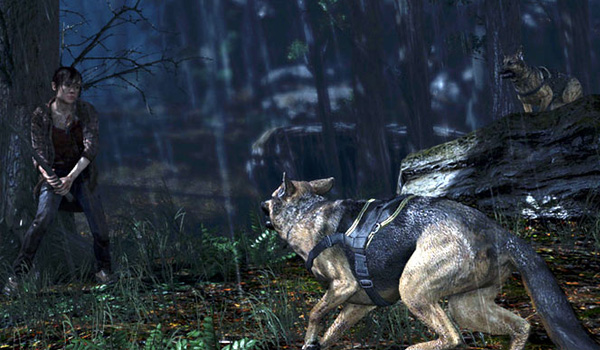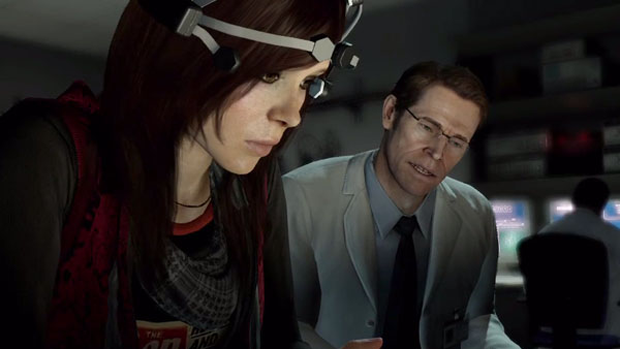
Beyond: Two Souls is a paranormal action thriller starring Ellen Page and Willem Dafoe. You’d be forgiven for assuming it’s a Hollywood film based on that description, but it is in fact the latest game from Quantic Dream, the studio behind the equally cinematic Heavy Rain. It’s tempting to compare the two, but Beyond is a different experience, opting to tell a linear story with fewer choices and consequences. As a big fan of Heavy Rain’s dynamic storytelling approach, I expected to be disappointed but as soon as I started playing I realised what writer and director David Cage was trying to achieve and felt satisfied to go along for the ride. Because what a ride it is…
The story follows Jodie Holmes, a troubled young woman struggling to piece together fragmented memories full of turmoil and supernatural weirdness. As you play, you dip in and out of her life at various ages, witnessing key moments in her childhood, teenage years and adulthood. Haunted by a mysterious entity she calls Aiden, which the player can take direct control of, Jodie is a fascinating character who feels real despite the surreal powers she wields. You help her navigate through many ordeals ranging from surviving her first teenage party, scratching out a living as a homeless beggar in the streets, to bombastic chases involving police squads and helicopters. When the game isn’t tugging at your heartstrings, it’s bombarding your senses with explosions and adrenaline. And it totally works.

Gameplay shifts between Jodie and Aiden, sometimes at your leisure, although you will usually need to use one or the other to deal with a given situation. In combat, Jodie’s actions are controlled via a simplified quick-time-event system. When engaged in a fight, for example, just as Jodie is about to punch the game goes into slow-mo, and you have to flick the right-analogue stick in the direction of her arm to pull it off. If you get it wrong, Jodie will get hurt, but there never seems to be any great consequences for getting these wrong, as the game moves on regardless. I never actually died during the entire course of the game, and according to other reviews I’ve seen, Aiden will simply heal you if you take too much damage. It’s one of many talents the ghostly entity can use, and the game becomes something else entirely when you take control of him.
Aiden is one of the most satisfying aspects of gameplay, and encourages some amusing moments. With a tap of the triangle button, you swoosh into Aiden and can float freely through the world like an invisible fly. When you’re looking at an object that can be manipulated, a blue dot appears near it, and upon activating the analogue sticks, you can move or possess whatever it is. This might be something as simple as knocking over a chair to scare someone, or messing with a television to distract a guard. Sometimes you can even possess people and take direct control of them, or kill them outright. This is usually only at pre-determined points where it’s relevant to the plot, but I didn’t find it frustrating to only be able to do this when the game’s narrative deemed it necessary. Limitations like this come with the territory of creating a game of this kind. The lack of freedom could be off-putting for some, but I believe you’ll be too engrossed in the tale to be bothered. It feels natural when you play it.

With David Cage at the writing and directing helm, Beyond features some hallmarks of his previous games. Most notably, this is the best motion-capture animation I’ve ever seen in a game, accompanied by some breathtaking attention to detail. It’s one of the most beautiful games on the Playstation 3 and pushes the tech to its absolute limit. With the exception of a large outdoor area set in the desert which felt a little bit lifeless to me, the game’s environments look magnificent, every scene carefully crafted to give the ultimate cinematic experience. I use that phrase carefully, because it’s a term that’s often thrown around for marketing purposes, but here it feels appropriate. Beyond prioritises itself as an interactive movie more than a videogame. That said, the benefits of being interactive lead to some strong emotional moments that feel all the more consequential because you were the one responsible for creating them.
One standout moment involves Jodie’s approach to her relationship with another character. You get to help her prepare for a dinner date in her apartment, including cooking the meal, tidying up the place, and getting Jodie dressed for the occasion. It sounds mundane, but I found it to be one of the most endearing moments in the whole game. Jodie has so much crap to deal with, I just wanted everything to go right for her in this otherwise everyday event. The jealous Aiden has other ideas, and while you are controlling Jodie, he is off causing havoc in the apartment, striving to undo your efforts so as to embarrass Jodie in front of her date. He doesn’t want to share her, you see…
Once your date arrives, Jodie’s control is mostly out of your hands and play switches to Aiden where you have the choice to continue misbehaving and ruining the evening, or simply sitting back to stalk them as they enjoy each other’s company. I felt an attachment to Jodie, so much as to hope she could find some happiness at long last, and her (my) efforts were rewarded with a kiss. Events naturally progressed from there to the bedroom, and just as things were getting quite intimate, Jodie freaked out. This was my fault. During an earlier chapter in the game, my choices led to Jodie almost being raped, which understandably had a serious emotional affect on her throughout the following years. It was heartbreaking to see, and a testament to how much thought Quantic Dream put into this one scene. As a player, I love it when I’m rewarded, or indeed punished for my actions in a game. It’s all the more impressive when presented in the context of a game that spans the entire length of a character’s life. The connection I felt with Jodie and Aiden made it a compelling and memorable experience.

It sure helps that Jodie is acted with such skill by Ellen Page. She delivers her lines with utter sincerity, even when that includes talking about the ‘Infraworld’ and other such sci-fi paranormal gibberish. Willem Dafoe equally shines as the scientist turned surrogate father-figure to Jodie. The chemistry between the two characters adds a level of depth that is difficult to achieve in a videogame, but thanks to the excellent performances from both actors, the emotional scenes pack just as much punch as the explosive action set pieces.
Of which there are many. Throughout the 12-hour rollercoaster, you’ll run across the top of a speeding train, fight groups of armed thugs, crash a helicopter, escape from a burning building and fight off swarms of paranormal flying creatures. It’s engrossing and exhilarating throughout, building up to a glorious climax that left me feeling satisfyingly exhausted.
I really enjoyed Beyond: Two Souls, and hope that it sold enough copies to fund Quantic Dream’s next game. David Cage and his team are unique in what they do, fusing cinema with gameplay, and while the lack of significant choices is felt here, it doesn’t stop this from being a thoroughly engrossing piece of entertainment.
